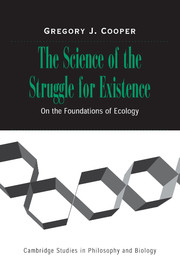Book contents
- Frontmatter
- Contents
- Introduction
- Acknowledgments
- 1 The Struggle for Existence
- 2 The Roots of Controversy
- 3 Must There Be a Balance of Nature?
- 4 The Pursuit of Ecological Generality
- 5 Model Building: A Controversial Craft
- 6 Theoretical Explanation and Fundamental Laws
- 7 The Explanatory Continuum
- 8 Theories, Models, and Explanatory Tools
- Epilogue
- References
- Index
5 - Model Building: A Controversial Craft
Published online by Cambridge University Press: 05 May 2010
- Frontmatter
- Contents
- Introduction
- Acknowledgments
- 1 The Struggle for Existence
- 2 The Roots of Controversy
- 3 Must There Be a Balance of Nature?
- 4 The Pursuit of Ecological Generality
- 5 Model Building: A Controversial Craft
- 6 Theoretical Explanation and Fundamental Laws
- 7 The Explanatory Continuum
- 8 Theories, Models, and Explanatory Tools
- Epilogue
- References
- Index
Summary
INTRODUCTION
What is the cognitive payoff of theoretical modeling? Put another way, what role does model building play in ecology as an epistemological enterprise? The answer to this question is important because it shapes expectations about what successful theoretical modeling should look like; and the controversies surrounding theoretical model building in ecology have largely been fueled by the (usually implicit) adoption of diverging sets of expectations. The role of theoretical modeling within the cognitive economy of ecological practice is, at bottom, a question for philosophy of science. Thus it comes as no surprise that appeals to philosophical accounts of science show up at various points in the course of this debate. However, philosophy has not had a very salubrious effect, primarily for the following two reasons. First, most of the appeal has been to a kind of Popperian vision of theory testing that does not capture the nature of theoretical modeling in ecology very well (Sloep 1993). Second, when the sampling of philosophy of science is both more current and more complete, we see that there is, in fact, no philosophical consensus to turn to on this matter.
The goal over the next four chapters is to identify the cognitive significance of theoretical modeling and thereby the standards of virtue to which such treatments ought to be held. The task is divided into several parts. This chapter is dedicated to understanding why theoretical modeling in ecology has been so controversial.
- Type
- Chapter
- Information
- The Science of the Struggle for ExistenceOn the Foundations of Ecology, pp. 128 - 175Publisher: Cambridge University PressPrint publication year: 2003



